Mobility / Traffic safety
Is Germany becoming a cycling country?
Since joining Mobycon in May, Bernhard Ensink has been traveling all over Germany, sharing Mobycon’s expertise with a variety of audiences. At the same time he has been observing how Germany is progressing at becoming a cycling country and where there is work still to be done. Below are his reflections so far. (German version available here: https://mobycon.com/updates/wird-deutschland-jetzt-ein-fahrradland/)
Something is going on in Germany. On top of ADFC’s permanent well-organized advocacy campaign #MehrPlatzFuersRad (More space for the bicycle), societal initiatives in about 15 cities have pushed and continue to push for bottom up so-called Radentscheide. This following the successful process for a Mobilitätsgesetz (Mobility Act) in Berlin to enable formal decisions at the local level on what municipalities have to do to support cycling. Since May 2019, Nationaler Radverkehrskongress (Transport Minister) Andreas Scheuer wants to be seen as a Fahrradminister as well. The minister reviewed the traffic rules to gain a better position of cycling and his ministry organized an interactive process for the new Nationaler Radverkehrsplan (NRVP 3.0). Is Germany becoming a Fahrradland – or a Cycling Country? Here are a few of my impressions from the last six months participating in events and meeting people throughout Germany.
Nationaler Radverkehrsplan 3.0
The minister announced an investment of €1.4-billion from 2020-2023 to support initiative like a seamless cycle route network in Germany and kicked-off on the 8th of October in Berlin a Forum of 23 experts to develop the new national cycling strategy (NRVP 3.0). They have to take into account one of the main results of an online survey: people want comfortable, safe infrastructure with safe intersections. I noted one of the minister’s statements: “We don’t need the autogerechte (car-ability) city, we need the menschengerechte (human ability) city; we need to reallocate space – the car has to give up space.” I observed a bit of scepticism and disbelief in the room and later on social media as the proof of the pudding is of course the eating, not just presenting the recipe. The minister is by the way under high pressure due to the failed plan for tolls on German Autobahnen.
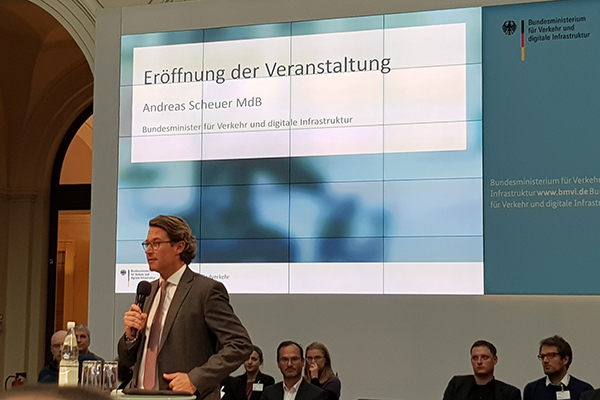
Berlin
Berlin, Germany’s capital, is in the spotlight in many respects; politcal changes at the regional (Land Berlin) and local level (Bezirke) with new ambitions and concrete projects (i.e. in that of the famous Bezirk Friedrichshain-Kreuzberg). I observed on the streets in during discussions what you could call constructive ‘street-fights’ when participating as a speaker in August at workshops of the Friedrichshain-Kreuzberg administration with citizens. Citizen ideas for the re-design of the Bergmann Straße were visualized by an expert and shown in September on plaques in the street for the follow up of the decision making process.
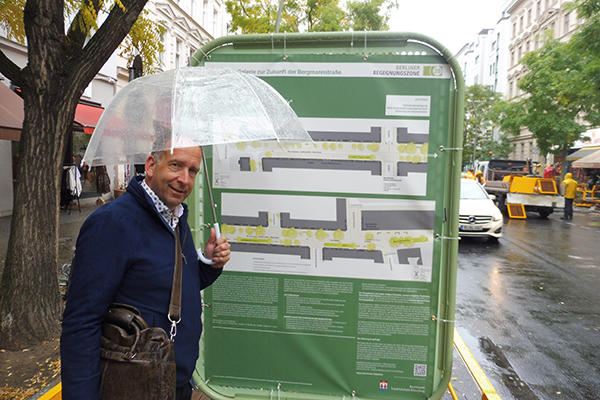
A terrible crash on the 6th of September of an SUV into a group of pedestrians and killing 4 people heated up the discussions about the negative impact of more and more big and heavy cars in the city and of car traffic in general, just a few days before the international automobile show IAA in Frankfurt that month. Following closely the German media (not only social media) I must admit that I see besides constructive fights for more livable cities also what I would call poor party-political games, i.e. around concrete (partly temporary) measures in Kreuzberg: parklets on car parking space, Diagonalsperren that avoid through traffic, and every Wednesday afternoon car free street to give space to kids.
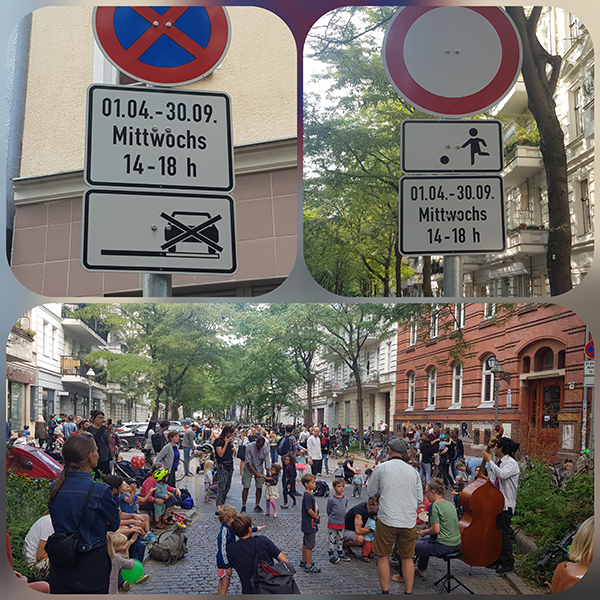
Protected Intersections
Fortunately something is happening in the concrete world of changing streets, planning and design. A packed room of 160 planners and experts from across Germany at the ADFC Fachtagung (conference) on safe intersections listened on the 26th of September to, amongst others, Mobycon’s CEO Johan Diepens, who presented design principles and how Mobycon supports municipalities in North-America and in Europe to build protected intersections. On top of the theme ‘Citizens’ Participation’, protected intersections were a main topic in my presentations at an open workshop organized by the Bielefelder Radentscheid organization in October. The trend I see is that German experts are looking more than ever to best practice from abroad.
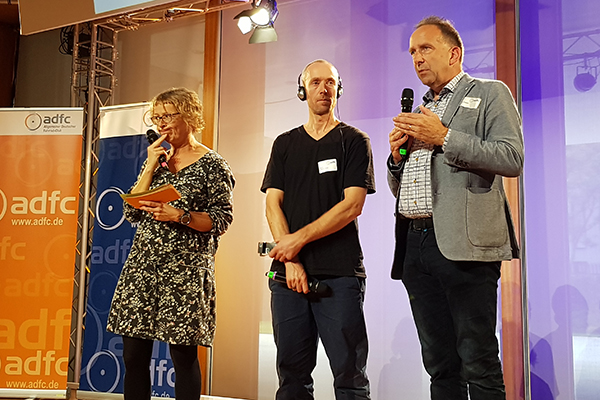
Frankfurt
Cycling in Frankfurt am Main, I recalled a quote from Minister Scheuer talking on the 8th of October about self-explaining and safe cycle paths. ‘Reading’ the streets in Frankfurt I understood that that they are built for cars and that even dedicated, but not physically protected, bicycle infrastructure is often used (illegally) for car parking as well. And I saw many intersections that need a redesign. Even during a short visit to the intersection Eckesheimer Landstraße/Adickesallee. I recorded on the 25th of October a near-miss (video below) between a right turning van and a cyclist. Despite of that all, I see, feel and hear when talking to people, not only in Frankfurt, that the societal pressure from the ADFC and other organisations and movements are becoming stronger and stronger and local governments and administrations seem to paying more attention to cycling than ever.
The rural area
Germany is for sure already a cycle tourism country. A leading one! I joined an event in the Bavarian county – Landkreis Neustadt a.d.Aisch-Bad Windsheim – where on the 16th of October a regional 1,200-km touristic route network of well-signed 12 thematic and 2 long distance cycle routes opened, created as an EU-co-funded project. Travelling by train to Neustadt an der Aisch and through other parts of Germany I see the potential in Germany to leapfrog to a real Verkehrswende. The federal government’s renewed attention to rail transport and to cycling could lead to good federal funds for regional and local authorities to build that seamless network of safe and comfortable cycling infrastructure (including bicycle parking) people are demanding.
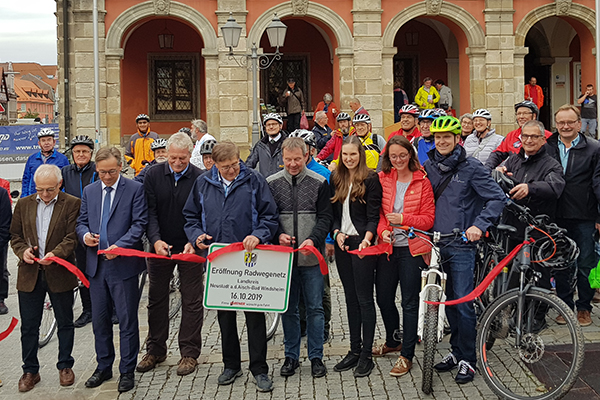
The federal government’s policy on gleichwertige Lebensverhältnisse (equal quality of life), frequently mentioned by German politicians at conferences, means cycle route networks in cities and in the towns and the rural area. If the smaller cities and sub-urban areas are well-connected by train Germany could unleash the potential of bike & ride I see in Germany to a level we are used to in The Netherlands. It is possible!
Will Germany become a cycling country? I tend to say: yes! I see at the horizon the Fahrradland Deutschland! The current speed of change is slow, but the societal pressure for safer streets, better public space and climate action in the mobility sector are unstoppable. By allocating federal budgets it can go faster. Will it remain an Autoland as well? Probably yes for the next decades, but hopefully on a lower level. Former minister of External Affairs, Joska Fischer, qouted recently the German Kaiser Wilhelm II: “I believe as in the horse, the automobile is a temporary phenomenon.” And Fischer stated regarding the necessary transformation in mobility: Wir schaffen das! (We can make it!) I wish that people in the two countries where I have my roots fight constructive ‘street fights’ for sustainable mobility systems – with great cycling infrastructure and cultures.
 ">
">Bernhard Ensink
‘Sustainable mobility for all – that’s what matters for me. The base for this is the combination and integration of the sub-systems walking, cycling and public transport in one sustainable mobility system. This is also crucial for the achievement of the Sustainable Development Goals.’

